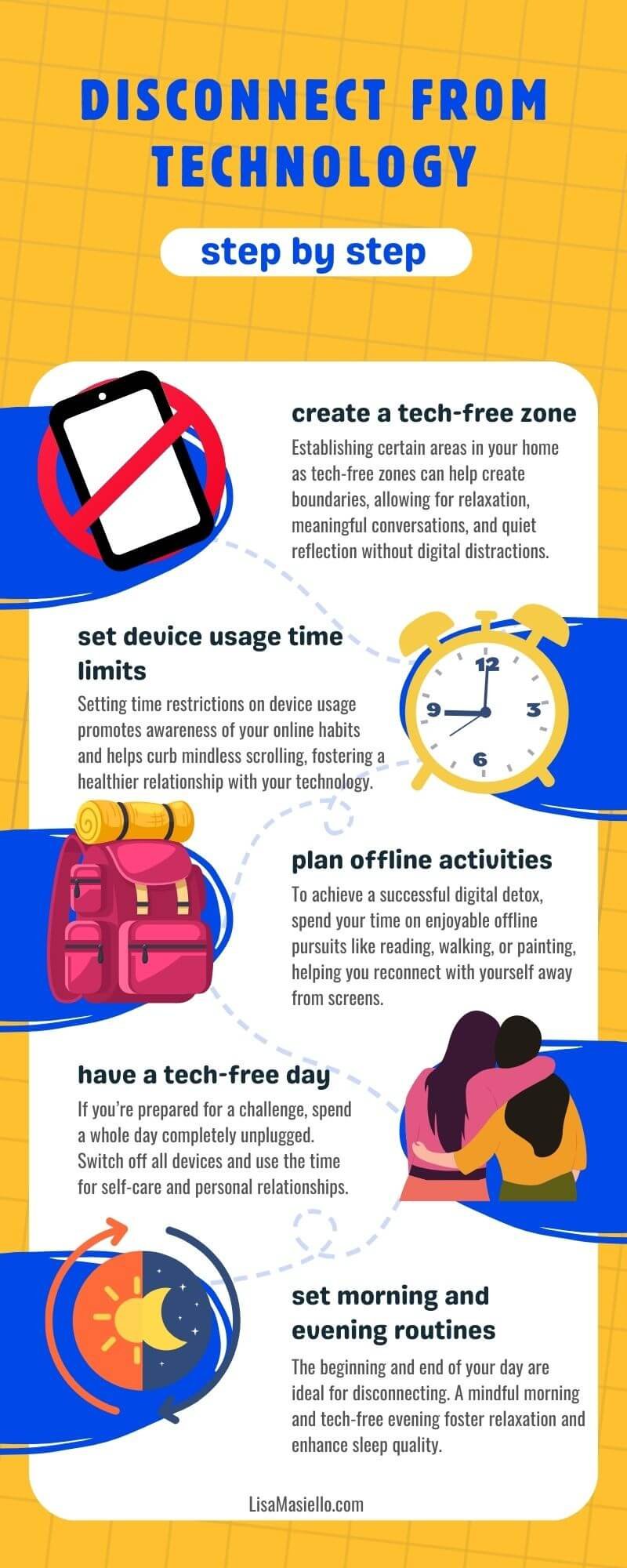Digital Detox: How to Disconnect and Reconnect with Yourself. Benefits, Steps to Take, and More.
Smartphone addiction is real.
Over half of U.S. adults, specifically 56.9%, say they’re addicted to their phones.
On average, Americans check their phones 144 times a day.
71% of people spend more time on their phones than with their partner.
Cell phones are a factor in more than 1 in 5 car accidents.
Source: Smartphone Addiction Statistics for 2025, Exploding Topics.
A digital detox offers the reset we need for mental and physical well-being.
In this digital age, being constantly connected feels inescapable. We think we can do nothing about it, so we accept its perceived control over every aspect of our lives. We rely on smartphones, computers, tablets, and social media to run our day, from when we wake up in the morning to fall asleep at night.
Most of us don't appreciate its toll on our well-being. While technology provides many advantages and makes some aspects of our lives significantly easier, it can also induce stress, make us feel anxious, and cause us to be out of synch with our true selves.
This is where a digital detox can make a meaningful difference.
A digital detox isn't just a temporary break from your smartphone. To be most effective, it should be a regular habit of unplugging from all technology to reconnect with your inner self and regain control over your life.
Whether you feel overwhelmed by technology's hold over both your personal and professional life, want to achieve life goals that currently seem unattainable, or reconnect with old friends, a digital detox offers the opportunity to slow down and reclaim your life and mental and emotional health.
What is a digital detox?
We usually hear of detoxing when someone is coming off drugs or starting a cleansing diet, commonly known as a body detox. But have you heard of a digital detox?
In the case of a digital detox, you avoid using electronic devices like smartphones, tablets, computers, and even gaming consoles and televisions for a specific period. The goal is to actively disconnect from the constant stream of emails, information, notifications, games, chats, and all the other electronic demands on your attention. In this world where we all seem chained to our devices, putting them down and stepping away enables us to regain control of our time and focus on more rewarding activities.
Of course, technology is an essential means of communication and can significantly increase productivity and efficiency in our personal and professional lives. But it can also leave us physically exhausted and mentally drained.
Endless scrolling through social media, consuming negative news, and constantly feeling like we must be available 24/7 can cause mental clutter and emotional fatigue. A digital detox offers a chance to reset, clear mental space, and recharge. By temporarily removing yourself from the digital world, you can reestablish boundaries, restore balance, and reconnect with yourself and those around you.
Do you need a digital detox?
Consider how technology affects your mood if you're wondering whether you could benefit from a digital detox.
Do you feel anxious when you're away from your phone?
Do you constantly check for new emails and messages, even when you know there are none?
Do you have trouble sleeping because you spend too much time on screens late at night?
These can all be indicators that your use of technology is taking a toll on your overall well-being.
You’re most likely so accustomed to your devices that you don't realize how much time you spend connected to them. And it's not just you. Feeling anxious when your phone is not within reach is common, affecting teenagers and adults alike. Some of us feel real stress and anxiety, which manifests itself in physical symptoms.
Constantly checking your phone for fear that you will miss something or that something is happening without you is a sign that your dependence on your phone is causing you to waste time and lose focus on more important things.
If this continues, it can damage personal relationships and physical health. Over time, you may withdraw from in-person activities and lose the interpersonal relationships that were once important to you.
Technology's toll on your body may manifest in eye strain, headaches, and neck pain. These can be signals that you may want to reassess your technology habits and consider a digital detox to rebalance yourself.
The benefits of unplugging.
One of the first things you'll notice as you set boundaries on your use of digital technology is that you have improved focus, your mind becomes sharper, and you are more productive and better able to complete projects more effectively and efficiently. It's difficult to focus when your head is full of digital clutter. A digital detox eliminates constant interruptions, giving your brain the space it needs to reset and let other thoughts in, reducing anxiety and stress.
Social media can trigger some of the worst problems, causing some individuals to constantly compare themselves to people they only know superficially or not at all. This can initiate anxiety and even depression due to the pressure to keep up with others' perceived lives. Stepping away relieves our "comparison culture" and negative interactions like online bullying. It opens the door to a greater level of mental well-being.
Disconnecting also improves your sleep. Reducing screen time before bed helps your brain relax naturally and encourages deeper, more restful sleep. You might also experience physical benefits like less eye strain and fewer headaches.
When disconnected, you'll likely find yourself more active. You may go for a walk, hit the gym, or play sports.
After just two weeks of participation in a digital detox study, 467 young adults (ages 18–30) saw average anxiety scores drop from 12.5 to 6.6, and depression scores fall from 14.7 to 8.3.
Source: Alanzi et al., "Examining the Impact of Digital Detox Interventions on Anxiety and Depression Levels Among Young Adults" (Cureus, 2024)
How to begin a digital detox.
Many of us are intimidated by the thought of putting our devices down and walking away. But you can ease the transition by taking small steps.
Start by designating an area of your home as a tech-free zone.
For example, you could keep your bedroom or kitchen free of devices. This creates boundaries between your digital life and personal space. I bet you'll feel calmer and more peaceful. Try it.
Second, limit how much time you spend on your devices. Check if your smartphone has a built-in monitor to track your time on various apps. Many do. Keeping track of how long you're on your phone can help break the cycle of endless scrolling.
A successful digital detox also involves planning other activities to fill your time. Consider picking up hobbies like reading, taking day trips, hiking, or practicing yoga—anything that brings you joy and keeps you engaged without screens.
Try activities that provoke personal artistic expression, like drawing or painting. Enjoying the creativity of adult coloring books can be relaxing and include various themes from flowers to sea creatures to inspirational messages and Bible verses.
If you're daring, you could dedicate an entire day to disconnecting. Turn off your phone, shut down your computer, and avoid screens for 24 hours. This can be an eye-opening experience that helps you reconnect with yourself and the world around you. Implement this over a weekend and see how much more refreshed you feel and ready to take on the new week ahead.
Establishing morning and evening routines that don't involve screens helps you maintain balance. Starting your day without immediately checking your phone creates a positive mindset with which you can begin your morning, while a screen-free evening routine signals to your brain that it's time to wind down, leading to better sleep and relaxation.
Reconnecting with yourself.
A digital detox isn't just about cutting back on screen time. It's about using that time to reconnect with yourself.
Meditation is a great way to become grounded and mindful. Sit still. Concentrate on your breathing. Live in the moment. This will calm your mind and help reduce stress.
Journaling is another popular tool for self-reflection. Writing down your thoughts, dreams, and emotions helps you better understand your feelings and passions, enabling you to focus on areas of your life you might want to reassess or change.
Spending time in nature is a great digital detox strategy. You can hike in the woods, stroll through a park, or simply sit outdoors. Being in nature has a calming effect on both the mind and body. Sometimes, you may want to walk alone, but other times, invite a close friend or family member. It's a great way to reconnect with another human being who means so much to you.
Have you ever had the experience of puttering around in your garden, and your mind wanders to projects you're working on or challenges you're trying to resolve? Surprisingly, the answer pops into your mind. But it's not a surprise at all. You've freed up your mind and opened the opportunity for a new understanding and insights to enter.
Maintaining a healthy relationship with technology.
Once you've completed a digital detox, the challenge becomes maintaining this balanced relationship with technology for the long term. Setting daily screen time limits can help prevent you from falling back into old habits. In addition, incorporating regular breaks throughout the day as a routine can lessen eye strain and discomfort and help prevent digital fatigue.
Once you've completed a digital detox, you may notice that in-person conversations and spending quality time with family and friends become much more fulfilling than chatting online. Actively participate in life again, whether grabbing coffee with friends, sharing a family meal, or enjoying time with your partner without the distraction of devices.
Finally, consider making digital detox a regular part of your routine. You don't have to wait until you feel overwhelmed to take a break. You can consistently refresh your mind and maintain a healthier relationship with technology by scheduling one tech-free day weekly or monthly.
In conclusion…
A digital detox offers the chance to break free from the constant noise of technology and reconnect with yourself. The person you really are.
Taking a break from your devices can positively affect both your mental well-being and physical health. It can also help strengthen your relationships and bring more balance to your day. These benefits are so worth it. Give it a try today.
About Lisa M. Masiello
Lisa M. Masiello is a business owner, author, and coach who equips new and aspiring business owners with practical tools and clear knowledge to break free from the stuck phase and make real progress. With over three decades of experience guiding fast-growing startups and large corporations in their marketing strategy, she knows what it takes to build momentum and deliver results.





